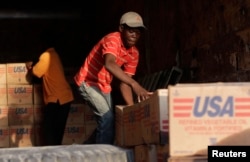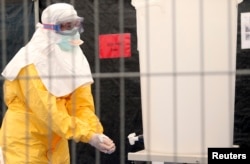Despite the U.S. government’s widespread effort to fight Ebola in West Africa, with thousands of troops and hundreds of millions of dollars, the private sector has shown little enthusiasm for charitable giving to the beleaguered region.
A few individuals and organizations have shown largesse. Mark Zuckerberg and Priscilla Chan recently pledged $25 million of the couple’s Facebook fortune to the CDC Foundation to combat the virus. Earlier, the Bill & Melinda Gates Foundation committed $50 million to international efforts, and Microsoft co-founder Paul G. Allen’s family foundation donated at least $20 million.
However, for most Americans, Ebola is "on our news radar, but it doesn’t seem to be on our philanthropic radar," said Patrick Rooney, associate dean of the Indiana University Lilly Family School of Philanthropy.
Since March, the virus ravaging West Africa has killed more than 4,500 and sickened at least twice as many, almost entirely in Guinea, Sierra Leone and especially Liberia. While recent infections in the United States have brought home the disease’s worldwide threat, to date “overall giving in this disaster has been pretty low – particularly by households and corporations,” Rooney said.
He and other experts attribute the tepid response to several factors: Americans’ limited familiarity with the continent, uncertainty about how best to help, and a perception among some potential donors that the U.S. government already is responding sufficiently on their behalf.
A billion-dollar battle
The World Health Organization estimates it will take almost $1 billion to halt the epidemic. The leaders of Guinea, Liberia and Sierra Leone have begged the international community for more funding, physicians and care facilities.
One indication of individuals’ restrained giving comes from the American Red Cross. Of the $2.9 million it has raised to combat Ebola in West Africa, all but $100,000 has come from Allen’s foundation. In contrast, the aid organization generated $486 million to assist Haiti after a devastating earthquake in January 2010 – most of it within the first six months, spokeswoman Jana Sweeny said.
Americans gave more than $1.4 billion overall for Haiti earthquake relief, according to evaluator Charity Navigator. They donated $1.6 billion to speed South Asia’s recovery after the 2004 Indian Ocean earthquake and tsunami.
The Haiti earthquake triggered a barrage of queries from individuals offering help, Sweeny said. Not so this time.
Nor has the aid organization solicited donations on its website’s home page. "We have a landing page specifically for Ebola,” she explained, adding that the International Federation of Red Cross and Red Crescent Societies is coordinating the response with the countries involved. The American operation has sent relief supplies and help with logistics.
Without prominent fundraising campaigns, individual donors may not know the best way to channel support to West Africa.
"I don’t know where I’d go to make a contribution to [fight] Ebola as a private citizen," said John Campbell, a former U.S. ambassador to Nigeria and a senior fellow for African policy studies at the Council on Foreign Relations in Washington. "There is no highly publicized appeal. There’s no ‘call 1-800’ message."
The U.S. Agency for International Development’s Center for International Disaster Information does have a list of nongovernmental organizations providing disaster relief, but it can be hard to find.
Some businesses bemused
Corporate America, too, has puzzled over what it can do.
"A lot of companies and individual donors are trying to figure out what is the most effective way to give," said Gerald McSwiggan, who oversees issue networks for the U.S. Chamber of Commerce Foundation’s Corporate Citizenship Center. "One thing has been drilled into them: Only help if you have a very clear path and can ensure that what you’re doing is going to be beneficial."
The foundation maintains an Ebola outbreak corporate aid tracker that, as of October 16, listed 60-plus companies collectively pledging $18.9 million in cash and in-kind support for West Africa.
"What you’re seeing now are companies that have a unique asset that they’re able to help with," McSwiggan said.
Among them: New Jersey-based Johnson & Johnson donated medical products and gave $1 million to the U.S. Centers for Disease Control and Prevention for health care workers’ safety in West Africa. Minnesota’s 3M sent nearly 1 million respirators for workers. California-based health plan Kaiser Permanente donated $1 million for direct medical care by Doctors Without Borders and International Medical Corps.
Tennessee’s FedEx delivery service sent more than $620,000 worth of medical supplies and pledged to help aid group Direct Relief meet transportation needs; Georgia’s UPS committed $500,000 in grants and services, such as shipping medical supplies and covering emergency funding for the World Food Program. Maryland-based Clorox Co., along with disaster relief group AmeriCares, donated 12,000 bottles of Ebola-killing bleach. South Carolina’s Cera Products Inc. donated 40,000 oral rehydration drinks.
The list is roughly split among domestic- and foreign-based firms.
Asked about motivating factors for donating, McSwiggan said "even U.S. companies these days are not U.S.-centric. They have employees around the world. They sell products around the world."
The foundation hosted a teleconference with representatives of the CDC and aid groups, so members could find out more about what was needed. McSwiggan said a second teleconference likely will be scheduled in the next few weeks.
"It’s still early on," McSwiggan said. "We do expect the donations to go up."
Government aid a deterrent?
The U.S. government’s strong support for West Africa – with a $1.3 billion commitment that includes sending at least 3,000 troops to build treatment units and labs – may be reducing individual Americans’ sense of urgency to help.
"A lot of times, philanthropy serves as a substitute when government doesn’t do things well,” Indiana University’s Rooney said, citing the response to Hurricane Katrina in 2005. Then, millions of Americans opened their wallets. Now, "most people seem to be saying, 'This is a government issue.' "
But some U.S. individuals and groups feel a personal commitment to aid West Africa.
Peace Corps community lends a hand
Among them are returned Peace Corps volunteers – including some who were withdrawn in July by the quasi-governmental agency as the Ebola virus advanced.
Sara Laskowski reluctantly returned to her home in Aberdeen, Maryland, after six months of Peace Corps volunteering on agriculture and business projects in a village near Guinea’s capital of Conakry. But she’s still devoting her time to West Africa – promoting an Ebola-fighting fundraiser for the National Peace Corps Association.
The alumni organization aims to raise at least $100,000, which it will distribute in grants of up to $3,000 to community groups in Liberia, Guinea and Sierra Leone. These could go toward emergency funds for feeding quarantined families, supplying bleach or delivering Ebola-awareness information in remote areas, for instance.
The association, now accepting applications, expects to award its first grants in early November. Successive grants will go out on a rolling basis.
"Our focus is to leverage our local contacts and find organizations – nonprofits – that are locally based," said Laskowski, who serves on the group’s steering committee, led by representatives of the worst-affected countries. "We think they will have the highest impact. They understand the culture. They already have the trust, and that’s been a huge issue."
Pat Reilly, a committee member who volunteered in Liberia in the early 1970s, predicted the donations and grants could have lasting value in the region.
"When the [Ebola] crisis is over," she said, "you’ll have these local people who’ve stepped up – and they’ll know how to handle other crises."






